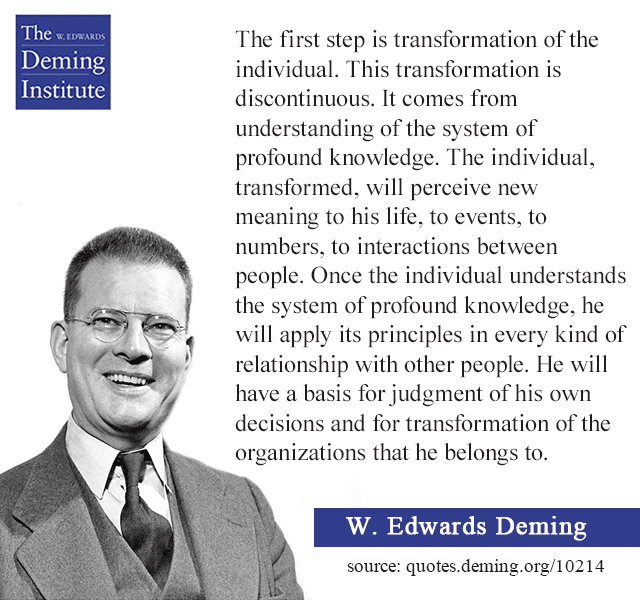Guest post by John Hunter, author of the Curious Cat Management Improvement Blog.
The video shows the presentation at our 2012 annual conference by David Langford – “When Deming Goes to School, Learning Takes a Front Seat.” A previous post on our blog included an except from this talk: Attributing Fault to the Person Without Considering the System.

Dr. Deming said your power comes from three primary sources. The first source is your formal position; as a student you don’t have a lot of formal position. You can’t just walk into a professor’s class and say, “You’re really screwed up. Let’s change this.” The second source of power is knowledge. The third source of power is personality.
You may have worked with people in the past – very knowledgable people, I mean, extremely brilliant people – who have no personality. You can’t get anything done because you can’t work with them. Or you may have worked with someone in the past who is just a great person to be around – but they are just clueless, they have no knowledge. Or you have someone in a formal position, but they have no knowledge or personality.
…
Deming often said, Hey you want to affect change? Don’t use your formal position: that is the least effective methodology for changing the situation.
I previously wrote a post on this idea: Knowledge, Personality, and Persuasive Power.
We have this concept we have to motivate people… when you understand the brain research and understand the psychological research you understand that you can’t motivate anybody. We are already well motivated…
The only thing you can do as a manager is demotivate people. When you start thinking like that you start thinking how am I operating, what am I doing that is causing people around me to be demotivated? Am I preventing them from thinking?
I believe that a manager can also take action to reduce the systemic demotivation present in the workplace (and I believe David agrees). There is a big shift from thinking that a manager must motivate people to thinking a manager needs to remove the barriers to people’s intrinsic motivation. (This of course was explained by Douglas McGregor in 1960 with theory x and theory y thinking in his book, The Human Side of Enterprise).
David gave a great example of his daughter’s professor listening to a student’s thoughts on how the methods being used to teach students could be improved (with a focus on how to harness student’s intrinsic motivation to learn, and thinking how to change some current processes that inhibited that motivation). It is a very rare teacher, or manager, that is willing to consider how they need to change (especially if the ideas are from their students or employees).
Deming’s message is really about transformation. Are you transforming the way you think, how you look at the situation? Are you learning to apply management techniques with the people around you, not for the purposes of manipulation? But can we form groups of study and ways to think about issues and what we do?
Are you transforming the way you think? That is the most important transformation. The focus isn’t first on how to transform the organization or fix all those things you wish other people would change. The important transformation is to change how you think. Of course the goal is to then apply your new knowledge and ways of thinking to make a difference in the world.
Related: Transformation of the Individual and the Organization – Video with Dr. Deming and David Langford: A Theory of a System for Educators and Managers – David Langford Presentation on Motivation and System Improvement
For more information about David’s current work, with Ingenium Schools, please visit ingeniumfoundation.org



